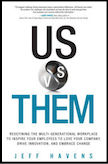Us vs. Them:
Redefining the Multi-Generational Workplace to Inspire Your Employees to Love Your Company, Drive Innovation, and Embrace Change
For the last 30 years, discussions about generational differences in the workplace have painted an increasingly complicated picture. Beginning with the advent of Generation X, speakers and authors have focused first on three, then four, and now sometimes five distinct generations operating side by side – each completely unique and distinct from all the others, and each requiring a different management approach in order to foster a healthy environment of collaboration and productivity. In this scenario, the more generations there are in the workplace, the more difficult it is to handle them all correctly.
But it doesn't have to be so. Us Vs. Them presents the issue in a simplified and intuitive two-generation model: Older, more-experienced workers and their Younger, less-experienced counterparts. Doing so meshes perfectly with the way we all naturally think, since our brain is wired for bilateral thinking and instinctively frames all issues into two major categories (yes vs. no, conservative vs. liberal, men vs. women, etc.). The two-generation model also allows us to collect all of the generational issues we face at work and frame them in straightforward terms that allow for simple solutions to what seem today like intractable problems.
Packed with statistics, historical analyses and real-world examples, Us Vs. Them addresses each of the root causes of generational tension at work – specifically our differing attitudes toward loyalty, innovation, change, career advancement, and continuing education. Readers will learn a surprising amount about their colleagues (hint: younger workers aren't nearly as disloyal as everyone thinks, and older workers aren't as loyal as they sometimes pretend) and ultimately walk away with a comprehensive collection of strategies to tackle every major generational issue they will face in the workplace for the rest of their careers. That is no exaggeration, nor is it difficult to deliver. We simply need to look at the world differently than current generational theory allows us to.



